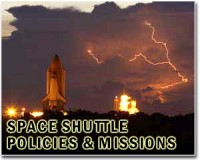 |
Cape Canaveral, Florida (AFP) Nov 5, 2010 A hydrogen leak in the external fuel tank of the space shuttle Discovery forced NASA to delay its final mission to the International Space Station Friday for the fifth time. "The next possible launch attempt will be, at this point, not earlier than Monday," said spokesman Allard Beutel, who earlier announced a minimum 48-hour postponement. Mission managers planned to meet later in the day to make a decision on the timing of the next launch attempt, the US space agency said after a series of delays brought on by bad weather and equipment problems. But the latest delay leaves little chance that the NASA will be able to send off the shuttle before the next launch window, which opens on December 1 and will stay open for a few days. The leak was found about two hours after operations began to fill the external fuel tanks with liquid hydrogen ahead of the launch, which had been set for 3:04 pm (1904 GMT). The hydrogen leak was detected at "an attachment point between the external tank and a 17-inch pipe that carries gaseous hydrogen safely away from Discovery to the flare stack, where it is burned off," NASA said. Heavy rain had scrubbed Thursday's launch of Discovery, after electrical glitches that postponed the launch three times earlier in the week were resolved. Discovery's 11-day mission with its all-American crew of six will deliver a pressurized logistics module called Leonardo, which will be permanently attached to the space station to provide more storage space. The shuttle will also bring Robonaut 2, the first human-like robot in space and a permanent addition to the orbiting space station, as well as spare parts. Two space walks, for maintenance work and component installation, are scheduled. The flight to the ISS is the fourth and final shuttle flight of the year, and the last scheduled for Discovery, the oldest in the three-shuttle fleet that is being retired in 2011.
NASA Shuttle Status ReportN The earliest opportunity is Monday, Nov. 8, at 12:53 p.m. EST, the last date Discovery can launch in this window. The next launch window for Discovery is Tuesday, Nov. 30 through Saturday, Dec. 5. At 8:11 a.m., launch was scrubbed because of a hydrogen gas leak at the Ground Umbilical Carrier Plate, or GUCP, an attachment point between the external tank and a 17-inch pipe that carries gaseous hydrogen safely away from Discovery to the flare stack, where it is burned off. Shuttle launch director Mike Leinbach characterized the leak as "significant," similar to what was seen on STS-119 and STS-127, although today's rate was higher in magnitude and occurred earlier in the fueling process. The external tank is being drained and will be inerted for about 20 hours before it is safe for technicians to look at the GUCP on Saturday. The Space Shuttle Program Mission Management Team will meet Saturday after technicians have had the opportunity to troubleshoot the hardware. The MMT will determine if it is possible to achieve a launch attempt Monday. NASA Television will air a news conference no earlier than 1 p.m. EDT with Mike Moses, Space Shuttle Program launch integration manager and Mission Management Team chair, and Mike Leinbach, shuttle launch director.
Share This Article With Planet Earth
Related Links Shuttle at NASA Watch NASA TV via Space.TV Space Shuttle News at Space-Travel.Com
 Shuttle Discovery launch delayed to Friday
Shuttle Discovery launch delayed to FridayCape Canaveral, Florida (AFP) Nov 4, 2010 The final scheduled launch of the space shuttle Discovery before being mothballed in a museum was delayed for a fourth time Thursday due to bad weather, the latest in a series of delays for orbiter's mission to the International Space Station. Heavy rain early Thursday buffeted Florida's Kennedy Space Center where Discovery had already been rolled out to the launchpad after early glitches th ... read more |
|
| The content herein, unless otherwise known to be public domain, are Copyright 1995-2010 - SpaceDaily. AFP and UPI Wire Stories are copyright Agence France-Presse and United Press International. ESA Portal Reports are copyright European Space Agency. All NASA sourced material is public domain. Additional copyrights may apply in whole or part to other bona fide parties. Advertising does not imply endorsement,agreement or approval of any opinions, statements or information provided by SpaceDaily on any Web page published or hosted by SpaceDaily. Privacy Statement |